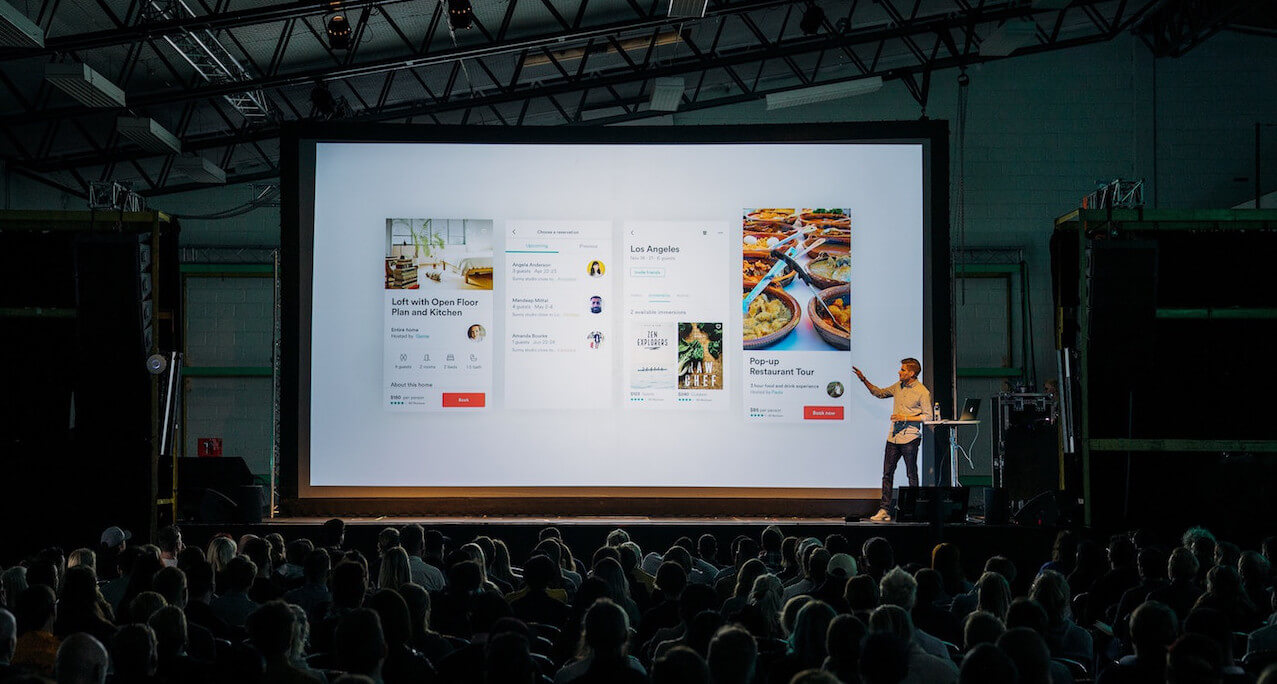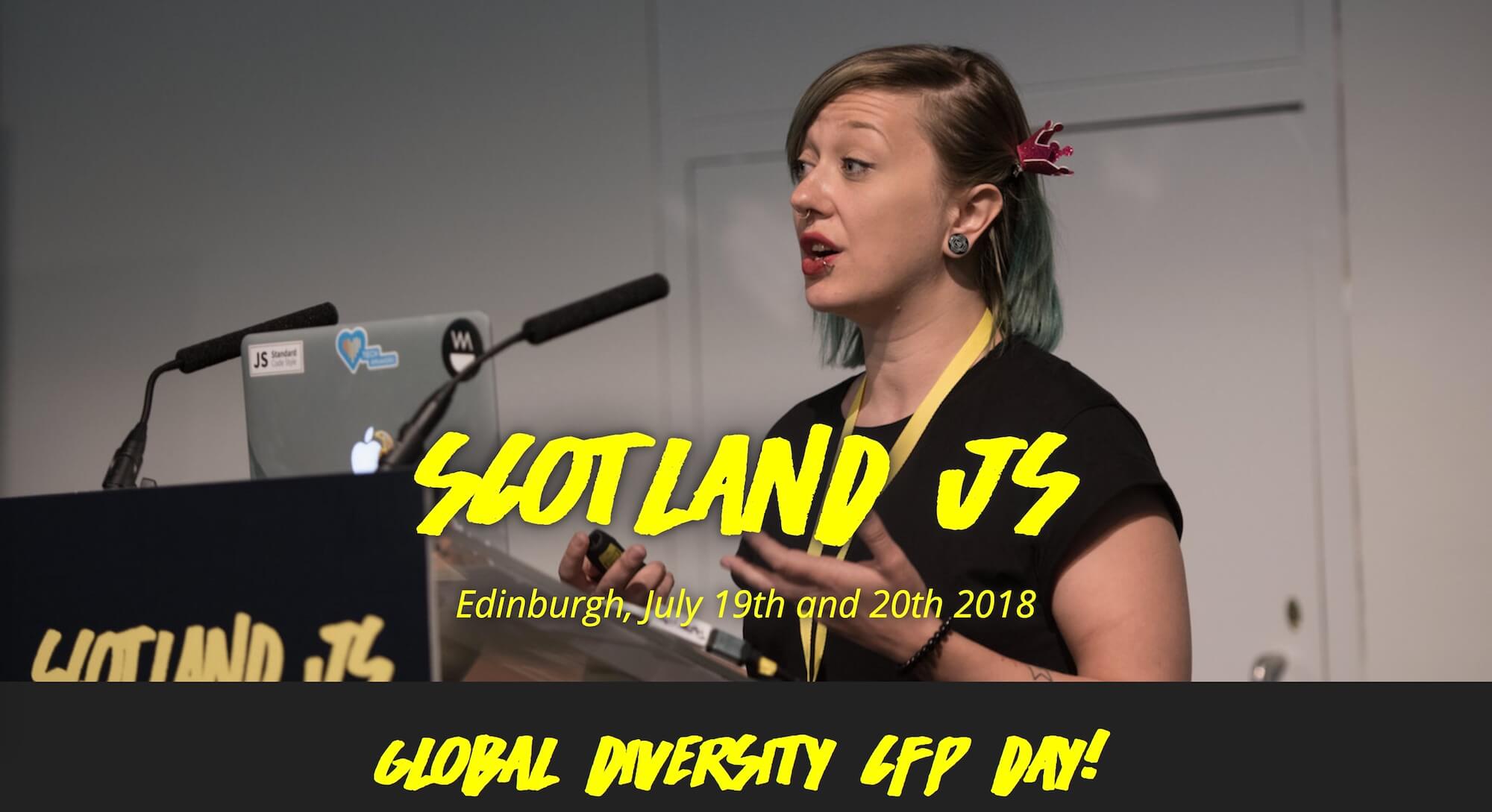So You Want To Speak At A Tech Conference?
Breaking down the barriers we put between us and the stage.
Monday 25 March, 2019 • Suze Shardlow • 7-minute read

Nothing says you’re an expert like being booked to speak at a conference. But how do you get invited if you have no idea what the selection committee is looking for - or, worse still, you can’t even decide on a topic?
Maybe you’re all ready to submit your talk proposal, but the thought of actually getting up there and delivering your presentation fills you with a strange mixture of excitement and terror…
I fell into the former camp. As Chapter Lead at Ladies Of Code: London and a former senior manager at the Met Police, I am no stranger to organising and speaking at large events. However, since pivoting my career and becoming a software engineer, I’ve found it hard to believe that there was a tech topic in the world that anyone would want to hear me talk about. I came to the workshop with vague ideas that I could talk about how I switched careers but this just didn’t seem technical enough for me.
Not so, Emanuil Tolev, my mentor at the 2019 Global Diversity CFP Day in London, assured me. Through a series of practical workshops carefully designed by the organisers, Emanuil coached me and two other keen techies to the point where each of us had not only developed a bio, concise topic and attention-grabbing abstract, but also felt confident enough to present these to the rest of the delegates and mentors at the conclusion of the event.
As well as Emanuil’s knowledge and expertise, we also drew on the experience of a range of guest speakers who shared some invaluable hints and tips which got us really drilling down into what we wanted to say.
 Global Diversity CFP Day originated in Scotland in 2016. This year, it came to thousands of would-be conference speakers in more than 75 cities worldwide. Their vision is that “more people from underrepresented groups within the industry feel safe, supported and encouraged to take to the stage and share their valued perspective and unique voice”.
Global Diversity CFP Day originated in Scotland in 2016. This year, it came to thousands of would-be conference speakers in more than 75 cities worldwide. Their vision is that “more people from underrepresented groups within the industry feel safe, supported and encouraged to take to the stage and share their valued perspective and unique voice”.
Here are some of the limiting beliefs we brought to the workshop and the advice that helped us leave them at the door…
1) “There are no new ideas…” aka “… but everyone already knows about X”.
There are always new perspectives. Your angle needs to be your experience: you are the only person who can tell your story.
To get to your talk title and proposal, Raquel Vélez, Platform Engineering Manager at Slack, recommends the prompts “what excites you? What pisses you off? What do you want to learn?”.
For Sarah Mei, founder of RailsBridge, inspiration comes from looking for themes running through all the things she’s had to research or learn about over the course of a week. RailsBridge teaches people to code and Sarah points out that “lots of people in your audience will be relatively new or from a different tech discipline from you,” so to them you won’t necessarily be stating the obvious.
2) “I’m not technical, so I can’t give a tech talk.”
Again, your talk is about YOU. (Are you noticing a pattern here?) Tell a story.
What is something you’re proud of? What have you learned? What have you struggled with?
CodeNewbie CEO and founder Saron Yitbarek says that while you could stand up and talk to people about how to use a piece of software, you will create far more impact by talking about how YOU used that tool to achieve something.
Things come in threes and the parts of a talk are no exception. Saron breaks these down into Technical, Story and Lessons Learned. But guess what? The technical stuff is great, but “NOBODY CARES”. Don’t go on about the technology: “your audience will not be familiar with your exact set of tools.”
And guess what again? Your lessons learned are great, but again, “NOBODY CARES. These end up sounding super generic,” says Saron. “Lessons learned and technical stuff only matter in the context of a story… A tech talk is a performance: it’s more theatre than anything else.”
3) “My talk won’t get picked.”
Raquel Vélez sits on conference selection committees and advises that, for abstracts, “wordier is better… some I see are far too short”. Pouring out all your ideas onto paper has the added advantage that if, once you’ve organised all your thoughts, you actually have four ideas, then you can write four different talk proposals.
Sarah Mei says you need to make sure your abstract shows people that after your talk “they will be able to do amazing things… how badass they will be.” Be specific about what you’re going to teach them! “Don’t say ‘in this talk we will…’. Put ‘have you ever wondered…?’ to them and say ‘you will see a solution if you come to this talk’.”
4) “I can’t think of anything interesting to put in my bio.”
In the same way you wouldn’t apply to different jobs using identical CVs, you need to tailor your bio to the conference you are applying to. Danielle Barnes, CEO of Women Talk Design says, “read what the organisers are asking for and read previous bios.”
She agrees with the other speakers: “Why are you uniquely qualified? No-one is an expert on you like you are.”
Danielle believes that a good bio structure means including what you’re about:
- Currently…
- Before that…
- Also…
The prompts she gave us to get there were:
- What lights you up?
- What’s the coolest thing you’ve accomplished?
- What are you a product of?
- What are some of your talk ideas? Why? Why you?
- What’s important about you that isn’t on your CV?
One of the people in my group said that he doesn’t put his interest in karate on his CV. It turned out that he is actually instructor-level!
5) “I’m not biased and my talk is suitable for anyone and everyone.”
Hmmm. Have you ever walked into a room and collectively greeted a group of people of different genders with “Hi guys!”? Yep, we all have. But have you stopped to think about the fact that the word “guys” actually means “men”?
We had an interesting discussion about this. Some people felt it was normal and harmless to say “guys” and they were keen to learn why it wasn’t. Tech is still a male-dominated field and some women are put off entering the industry because of what they’ve seen or heard about the culture.
One mentor shared that in his organisation, they have a Slack bot who pulls them up on any blanket “guys” greetings and suggests alternatives.
It’s important to strive to ensure people don’t feel excluded. This means considering accessibility and special needs, for example using visuals which will not cause issues for those with colour blindness, or pre-warning your audience about any epilepsy triggers, profanity etc.
6) “I’ve been accepted… but I’m not prepared!”
Having worked in marketing and business development, I’ve created a lot of PowerPoint decks but always felt they needed to be more eyecatching. Melinda Seckington, Technical Manager at FutureLearn, drew on Lidwell, Holden and Butler’s Universal Principles Of Design to advise us to:
Maximise signal and minimise noise: “Your slides are not your teleprompter and they are not your post-talk notes.” Slides are more often than not misused in this way!
Make important information stand out: “Humans remember things that are noticeably different from things that are common.”
Show AND tell: “Information recall is better when using text and images.”
Be consistent: “I don’t mean ‘let’s make everything look the same!’” You can use different designs, but use consistent ones for slides with the same purpose eg section headings.
Once you’ve created your deck and think you are ready for the big day, think again. Jessica Rose, Developer Program Product Manager at Mozilla, gave us a checklist of things we should look at and ask about at the venue before we go anywhere near the stage wielding our clickers! She also highlighted activities with a high risk of failure, for example video, audio and live coding. It’s always best to have a version of your talk that can be delivered entirely without access to the Internet - or even without a laptop.
In terms of the delivery itself, Jessica advises that you pace yourself - “it’s easy to go very quickly”. I usually use the presenter view in Keynote, as it shows me a duration clock so I know how much time has elapsed.
Jessica left us with two thoughts: don’t be scared of messing up (“we make language errors all the time”) and “when you’re on stage, you have an aura of expertise”.
A number of delegates from the first Global Diversity CFP Day in 2018 have since spoken at conferences. I’m working on honing my bio and abstract and will be submitting them soon! When I give my first tech talk, I will be sure to blog about the experience.
Had a great time today. People came up with super clear, sharp proposals. Mentoring was a breeze, honestly. I think only [https://twitter.com/SuzeShardlow?ref_src=twsrc%5Etfw][@SuzeShardlow] from my group is on Twitter and reckon I'll be seeing her "From policing to programming: how I switched careers when I turned 40" at a conf soon! [https://t.co/g0NXbclQ8w] [https://t.co/g0NXbclQ8w]
— Emanuil Tolev (@emanuil_tolev) March 2, 2019
Many thanks to Nexmo for hosting us, to Myrsini Koukiasa for organising the event and to all the mentors who gave up their Saturday to coach and encourage us.